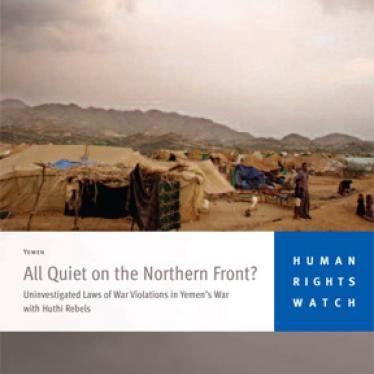Since a Yemen-based militant group's claim of responsibility for the failed Christmas Day plot to blow up an airliner over Detroit U.S. policy makers have been paying more attention to Yemen. In early March, Yemen launched airstrikes on suspected al Qaeda hideouts, and in mid-March, Yemeni security forces arrested a U.S. man in San'a on suspicion of belonging to al Qaeda. Figuring out what to do about it has been more difficult. Should the U.S. primarily help Yemen's security forces to defeat the militant group, Al Qaeda in the Arabian Peninsula, by capturing or killing its members? Or is it also necessary to reduce the lawlessness and impunity in Yemen on which the militant group thrives?
The U.S. appears to lean toward the first option, judging by the quick increase in military aid to Yemen. Yet Secretary of State Hillary Clinton seemed to recognize that military aid alone won't do the job. At the high-level meeting on Yemen in London on January 27, called by the U.K. to discuss problems that threaten the stability of Yemen and the region, Clinton said that "bringing unity and stability to Yemen is an urgent national security priority of ours."
Here is the core of the problem: Yemeni security forces are themselves responsible for grave violations of human rights and the laws of war in their battles with peaceful domestic opposition, armed rebels, and violent militants. Rather than "resolving conflict and ending violence," as Clinton pledged in London in January, U.S. counterterrorism assistance in Yemen risks becoming complicit in the human rights abuses of the Yemeni government.
Human Rights Watch research into both the five-year conflict with Huthi rebels in Yemen's north (a truce was declared on February 11, but previous truces have not lasted) and into the government's response to peaceful separatist demonstrators in the south illustrates the danger of building up Yemen's security forces without changing its approach to its own population.
Assistant Secretary of State Jeffrey Feltman and U.S. Central Command Chief General David Petraeus, in congressional testimony in February and March, agreed that these conflicts and a large number of refugees in the country complicate dealing with the threat from al Qaeda. But the U.S. can't quite seem to make up its mind. Petraeus in his testimony vowed to "address the root causes of instability rather than apply quick fixes to their symptoms." But Clinton, at the January London meeting, pledged "non-interference" in Yemen's affairs.
Our conversations with government ministers makes it clear that current policy favors short-term fixes to underlying problems without addressing the human rights crises arising from Yemen's domestic conflicts. Failure to do so, however, would undermine the long-term struggle against militant extremism and that too-close association with the Yemeni government in counterterrorism measures risks further increasing militancy and instability.
In a report on the Sa'da conflict issued yesterday, Human Rights Watch details allegations of how Yemen's military indiscriminately bombed populated areas in the north in its war on the Huthis, causing civilian casualties. Huthi forces also violated of the laws of war by engaging in summary executions, use of non-combatants to deter an attack, pillage and looting, and prevention of flight of civilians, including for medical treatment. Both parties used children in combat. Yet neither party has held anyone responsible for these crimes, deepening the culture of lawlessness and impunity that has characterized this conflict and, based on the recent claims of the Saudis from their border conflict with the rebels, allowed al Qaeda to make inroads into the area.
Similarly, a December Human Rights Watch report detailed how Central Security Forces under the Ministry of Interior used unlawful lethal force against peaceful demonstrators in southern Yemen, killing at least 11. No one was held accountable, and since the beginning of the year, violence at protests has further escalated, turning more southern Yemeni areas into no-go zones for government officials, and providing a haven for al Qaeda. Nevertheless, Feltman on an early March visit to Yemen declared the southern separatist movement protests an "internal" issue.
Al Qaeda has tried to garner support by expressing solidarity with victims of Yemeni government violations against the separatists. In turn, counterterrorism measures against al Qaeda in southern provinces have fuelled sympathy for al Qaeda, especially where these measures resulted in civilian casualties. Feltman's comments came on the same day as the Yemeni deputy prime minister for defense and security, Rashad al-‘Alimi, apologized to victims' families over the killing of 42 civilians in a U.S.-assisted airstrike on suspected militants in the southern Abyan province on December 17, 2009.
Yemeni security forces have also repeatedly abducted and "disappeared" suspected insurgents, terrorism suspects, and critics of government policy, undermining counterterrorism measures by creating solidarity among the victims of the Yemeni government violations that include al Qaeda.
The U.S. should forthrightly address these human rights abuses in Yemen - as part and parcel of its counterterrorism strategy - by calling on Yemeni officials to investigate laws of war and human rights violations and press for the prosecution of those responsible. The U.S. should also support the deployment by the United Nations Office of the High Commissioner for Human Rights of a human rights monitoring and reporting mission to Yemen.
Under the eyes of an independent party, it would be a lot harder for all sides in these conflicts to threaten or harm civilians. Such a presence could also strengthen accountability by making it harder to ignore abuses when they occur.
Most importantly, standing up to San'a's human rights abuses would make it impossible for Yemen's government to claim victory over murderous terrorists by attacking innocent civilians.
Christoph Wilcke is a Middle East researcher for Human Rights Watch







